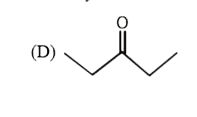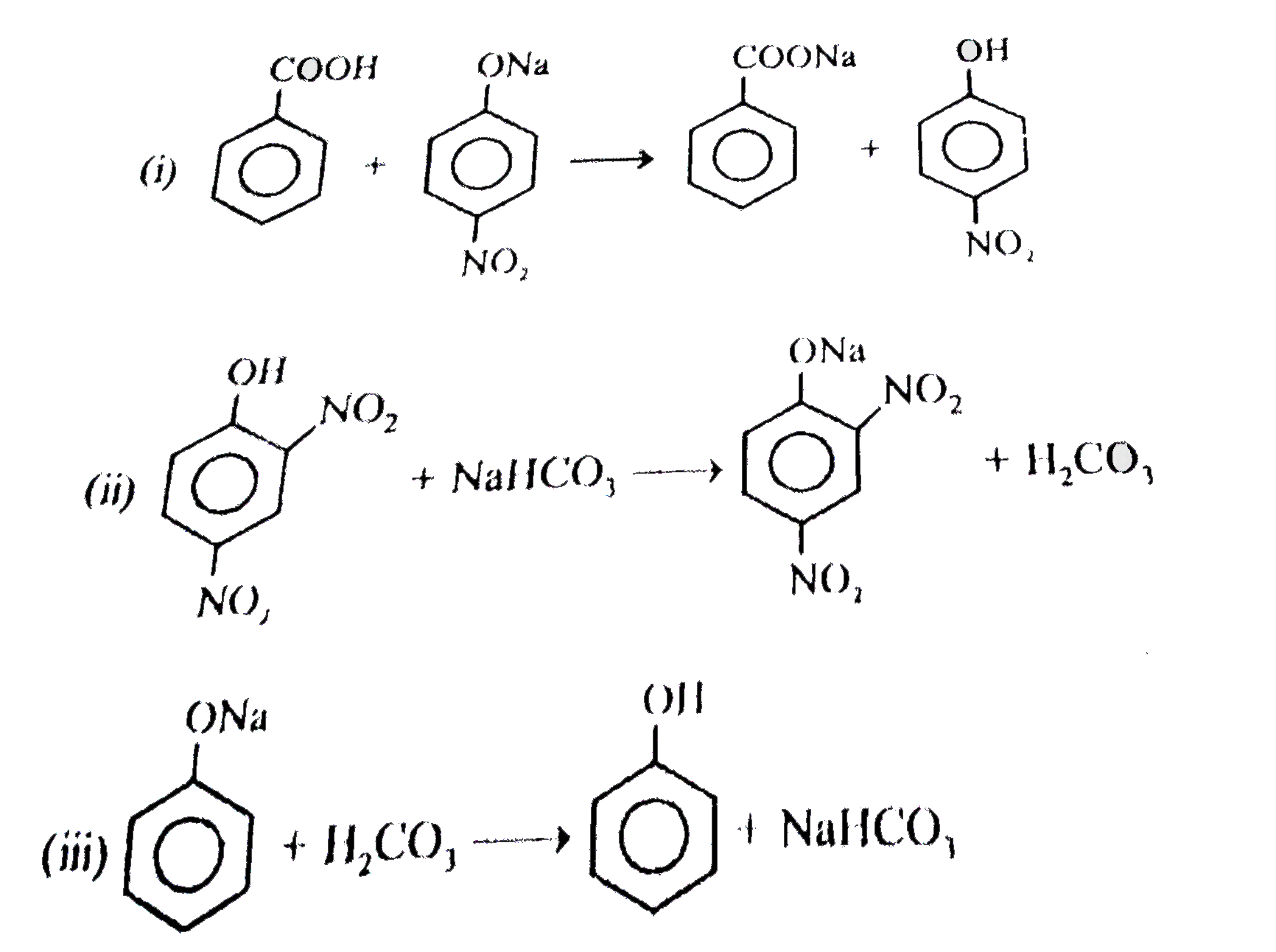Which of the following compounds does not react with NaHSO3?
H−O∣∣C−H
CH3−O∣∣C−H


The correct Answer is:D
To determine which compound does not react with NaHSO₃ (sodium bisulfite), we need to analyze the reactivity of the given compounds with respect to nucleophilic addition reactions. NaHSO₃ acts as a nucleophile and typically reacts with carbonyl compounds (aldehydes and ketones).
1. Identify the Compounds:
We need to look at the given compounds and identify their structures. The compounds typically include aldehydes, ketones, or other functional groups.
2. Understand the Mechanism:
NaHSO₃ dissociates into Na⁺ and HSO₃⁻. The HSO₃⁻ ion acts as a nucleophile and attacks the electrophilic carbon in carbonyl compounds (C=O).
3. Evaluate Reactivity:
- Aldehydes (e.g., HCHO): Aldehydes have a carbonyl group that is highly electrophilic and will react with NaHSO₃.
- Ketones (e.g., CH₃C(=O)OH): Ketones also have a carbonyl group and will react similarly.
- Bulky Groups: If a compound has bulky groups around the carbonyl carbon, steric hindrance can prevent the nucleophile from approaching the electrophilic carbon.
- Electron Donating Groups: If the carbonyl carbon is surrounded by electron-donating groups, this can reduce its electrophilicity, making it less reactive.
4. Analyze Each Option:
- Option 1: HCHO (formaldehyde) - Reacts with NaHSO₃.
- Option 2: CH₃C(=O)OH (acetone) - Reacts with NaHSO₃.
- Option 3: CH₃C(=O)CH₂CH₃ (butan-2-one) - Reacts with NaHSO₃.
- Option 4: CH₃CH₂COOCH₂CH₃ (ethyl acetate) - This compound has an ester functional group and does not have a carbonyl carbon that is electrophilic enough to react with NaHSO₃.
5. Conclusion:
The compound that does not react with NaHSO₃ is Option 4: CH₃CH₂COOCH₂CH₃ (ethyl acetate).
We need to look at the given compounds and identify their structures. The compounds typically include aldehydes, ketones, or other functional groups.
NaHSO₃ dissociates into Na⁺ and HSO₃⁻. The HSO₃⁻ ion acts as a nucleophile and attacks the electrophilic carbon in carbonyl compounds (C=O).
- Aldehydes (e.g., HCHO): Aldehydes have a carbonyl group that is highly electrophilic and will react with NaHSO₃.
- Ketones (e.g., CH₃C(=O)OH): Ketones also have a carbonyl group and will react similarly.
- Bulky Groups: If a compound has bulky groups around the carbonyl carbon, steric hindrance can prevent the nucleophile from approaching the electrophilic carbon.
- Electron Donating Groups: If the carbonyl carbon is surrounded by electron-donating groups, this can reduce its electrophilicity, making it less reactive.
- Option 1: HCHO (formaldehyde) - Reacts with NaHSO₃.
- Option 2: CH₃C(=O)OH (acetone) - Reacts with NaHSO₃.
- Option 3: CH₃C(=O)CH₂CH₃ (butan-2-one) - Reacts with NaHSO₃.
- Option 4: CH₃CH₂COOCH₂CH₃ (ethyl acetate) - This compound has an ester functional group and does not have a carbonyl carbon that is electrophilic enough to react with NaHSO₃.
The compound that does not react with NaHSO₃ is Option 4: CH₃CH₂COOCH₂CH₃ (ethyl acetate).
Topper's Solved these Questions
- CARBONL COMPOUNDSBOOK - MOTIONCHAPTER - CARBONL COMPOUNDSEXERCISE - EXERCISE -2 (LEVEL-II)
18 Videos
- CARBONL COMPOUNDSBOOK - MOTIONCHAPTER - CARBONL COMPOUNDSEXERCISE - EXERCISE - 3
10 Videos
- CARBONL COMPOUNDSBOOK - MOTIONCHAPTER - CARBONL COMPOUNDSEXERCISE - EXERCISE -1
40 Videos
- BIOMOLECULES & POLYMERSBOOK - MOTIONCHAPTER - BIOMOLECULES & POLYMERSEXERCISE - EXERCISE - 4 (LEVEL II)
17 Videos
- CARBOXYLIC ACIDBOOK - MOTIONCHAPTER - CARBOXYLIC ACIDEXERCISE - Exercise - 4 (LEVEL - 2 )
22 Videos
Similar Questions
Knowledge Check
Which of the following compounds does not react with NaOH?
ACH3COOHBCH3CONH2CC6H5OHDCH3CH2OHWhich fo the following compounds does not react with NaHSO3 ?
ACH3COOHBCH3CONH2CC6H5OHDCH3CH2OHWhich of the following compounds does not react with NaOH ?
ACH3COOHBCH3CONH2CC6H5OHDCH3CH2OH
Which of the following compounds does not react with sodium?
View SolutionWhich of the following compounds does not react with NaNO2 and HCl?
View SolutionWhich of the following compounds does not react with 1∘ and 2∘ amines to form amides ? .
View SolutionWhich of the following compounds does not react with acetyl chloride ?
View SolutionWhich one of the following compounds does not react with bromine
View Solution
